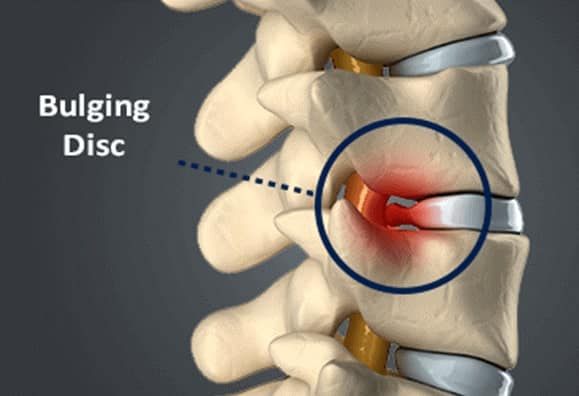
Relevant Anatomy
The discs in the human body serve an important role in supporting the spine and allowing for movement. There are 23 discs in the human spine, located between each vertebra, except for the first two vertebrae in the neck.
The main purpose of the discs is to act as shock absorbers for the spine, helping to distribute the weight and pressure of the upper body across the spine. This helps to prevent damage to the vertebrae and other structures in the spine.
What is a disc bulge?
A disc bulge is a condition that occurs when one of the discs in the spine protrudes out of its normal position and presses against nearby nerves or structures. It can cause pain, numbness, tingling, and weakness in the affected area.
Why do disc bulges occur?
Disc bulges can occur due to a variety of reasons, including:
- Age-related wear and tear: As we age, the discs in our spine lose some of their water content, making them less flexible and more prone to damage.
- Trauma: Disc bulges can also occur due to trauma, such as a fall or car accident, that puts excessive pressure on the spine.
- Repetitive stress injuries: Repetitive movements, such as heavy lifting, can also lead to disc bulges over time.
- Poor posture: Poor posture can put extra stress on the spine, leading to disc bulges.
- Obesity: Excess weight can put extra pressure on the spine, leading to disc bulges.
- Genetics: Some people may be more predisposed to disc bulges due to genetic factors.
It is important to note that disc bulges can occur for multiple reasons, and a combination of these factors may contribute to the development of a disc bulge.
Treatment
Treatment for a back disc bulge may include rest, physiotherapy, pain medication, and in severe cases, surgery. It is important to consult a medical professional and or a physiotherapist for proper diagnosis and treatment, as untreated disc bulges can lead to further complications.

Written by Andrew Adel Ishak
Andrew Adel Ishak, a highly qualified physiotherapist with a Bachelor of Physiotherapy, specialises in managing sports and musculoskeletal injuries and treating Benign Paroxysmal Positional Vertigo (BPPV). He is passionate about reducing pain and maximising function for his patients.
My Physio My Health
Trust our team of physiotherapists to help you recover faster and improve your quality of life.

 WISHING EVERYONE A HAPPY NEW YEAR! WE'VE RETURNED TO OUR REGULAR OPENING HOURS
WISHING EVERYONE A HAPPY NEW YEAR! WE'VE RETURNED TO OUR REGULAR OPENING HOURS



